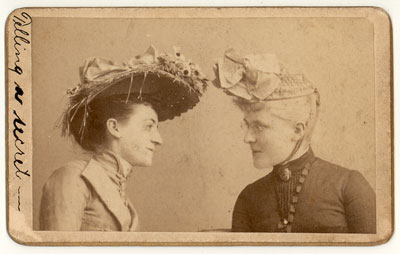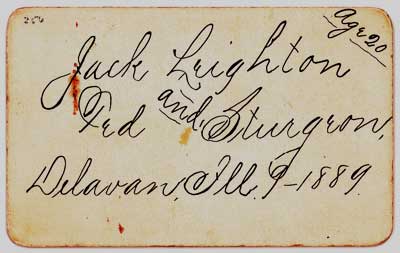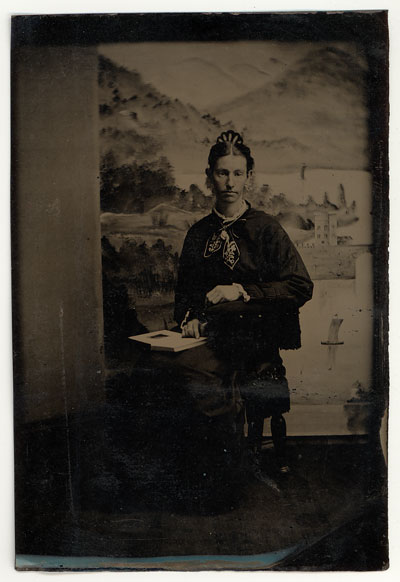Difference between revisions of "Wilson Collection: Nineteenth Century Gender Transgressions"
(Nineteenth century gender transgressions) |
(Nineteenth century gender transgressions) |
||
| (5 intermediate revisions by the same user not shown) | |||
| Line 1: | Line 1: | ||
[[File:Twowomen.jpg]] | [[File:Twowomen.jpg]] | ||
| − | [[File: | + | ''Inscription on reverse side of the above photo:'' |
| + | |||
| + | [[File:Twowomenbkfixed.jpg]] | ||
[[File:Chair.jpg]] | [[File:Chair.jpg]] | ||
[[File:Tintype.jpg]] | [[File:Tintype.jpg]] | ||
| − | |||
| − | |||
'''Nineteenth Century Gender Transgressions''' | '''Nineteenth Century Gender Transgressions''' | ||
| − | In his book Re-Dressing America's Frontier Past, historian Peter Boag states that “America's frontier past...was a place where a wide variety of people who did not conform to gender and sexual expectations lived, loved, and died.” | + | In his book ''Re-Dressing America's Frontier Past'', historian Peter Boag states that “America's frontier past...was a place where a wide variety of people who did not conform to gender and sexual expectations lived, loved, and died.”<ref>Peter Boag, ''Re-Dressing America's Frontier Past'' (Berkeley: University of California Press, 2011), 196.</ref> Indeed, he reveals that “same-sex sexuality and gender fluidity represented in and by the cross-dresser actually lay at the very heart of the classic Old West.”<ref>Boag, 196. </ref> |
The photographs shown here verify that early gender transgression occurred also east of the Pecos. Written on the reverse side of the dual portrait is “Jack Leighton” and “Ted Sturgeon” of Delavan, Illinois from (apparently) September 1889. The seated individual is identified on back as as “Mr. C. Reil,” of “Kellogg Minn” (Minnesota). The place and time of the tintype image are unknown, but the photograph appears to date from the mid-19th-century. | The photographs shown here verify that early gender transgression occurred also east of the Pecos. Written on the reverse side of the dual portrait is “Jack Leighton” and “Ted Sturgeon” of Delavan, Illinois from (apparently) September 1889. The seated individual is identified on back as as “Mr. C. Reil,” of “Kellogg Minn” (Minnesota). The place and time of the tintype image are unknown, but the photograph appears to date from the mid-19th-century. | ||
| − | ''References'' | + | ==''References''== |
| + | <references /> | ||
| + | |||
| + | |||
| − | + | ==''To return to "Exhibit contents" links, click:''== | |
| − | + | ==[[Rich Wilson: Aspects of Queer Existence in 19th-Century America]]== | |
Latest revision as of 11:05, 26 November 2012
Inscription on reverse side of the above photo:
Nineteenth Century Gender Transgressions
In his book Re-Dressing America's Frontier Past, historian Peter Boag states that “America's frontier past...was a place where a wide variety of people who did not conform to gender and sexual expectations lived, loved, and died.”[1] Indeed, he reveals that “same-sex sexuality and gender fluidity represented in and by the cross-dresser actually lay at the very heart of the classic Old West.”[2]
The photographs shown here verify that early gender transgression occurred also east of the Pecos. Written on the reverse side of the dual portrait is “Jack Leighton” and “Ted Sturgeon” of Delavan, Illinois from (apparently) September 1889. The seated individual is identified on back as as “Mr. C. Reil,” of “Kellogg Minn” (Minnesota). The place and time of the tintype image are unknown, but the photograph appears to date from the mid-19th-century.
References



